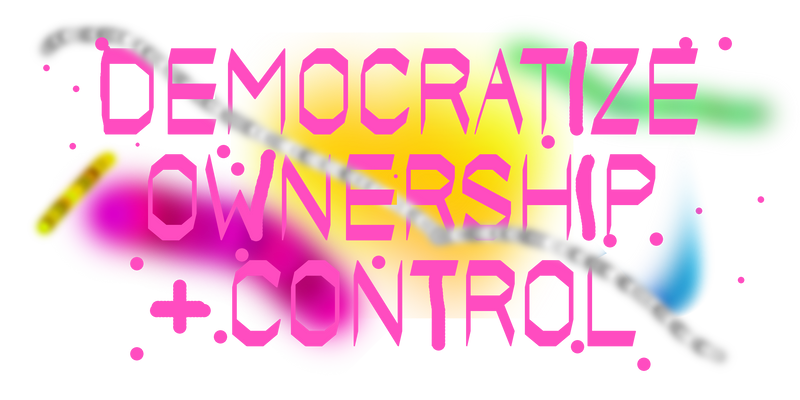How to start a cooperative
Introduction
For the past two years, I’ve worked with a team to build Ampled, an artist and worker-owned web platform for direct community support of musicians. By applying a cooperative business model to the web, we’re making a platform that’s owned and controlled by its community, instead of by investors. Our hope is that by developing this model, it can be a seed for something transformative: ideally a new economic operating system for sustainable community support.
Idealism aside, starting a cooperative business is not easy. Perhaps due to a residual Cold War-era aversion to anything resembling a critique of capitalism, alternatives to investor-owned corporations are barely taught in the vast majority of American business and law schools. When I began researching how I might start one myself, I went to the Business & Career Center at the Brooklyn Public Library and found exactly zero books on starting cooperatives. There were a few dusty books on co-ops in the basement archives, but trust me—they weren’t much help. It’s odd, because cooperatives aren’t new, unusual, or rare. Recognizable names like R.E.I., The Associated Press, and Land O’Lakes are all co-ops. In many ways, cooperative ownership models predate investor-owned corporations. They’re all around us, but can feel invisible.
In the book Everything for Everyone: The Radical Tradition that Is Shaping the Next Economy, professor Nathan Schneider refers to co-ops as a “radical tradition.” In this same spirit of passing on ideas through inherited knowledge, I’d like to share what I’ve learned about starting a cooperative through this guide. What follows isn’t meant to provide a prescriptive technical checklist for creating a cooperative. If that’s what you are looking for, Democracy at Work Institute has a fairly comprehensive library of resources. Instead, in this guide, I’m passing along the attitudes and beliefs that helped guide our process in the hope that they can be useful.
— Austin Robey, Worker-Owner/Co-founder of Ampled

First of all, what is a cooperative?
A cooperative is a collectively owned enterprise that serves the interests of its members. This means a company owned by its workers, customers, or both.
Co-ops are for-profit, private enterprises.
There is often a misconception that co-ops are non-profits. This isn’t true. Like traditional companies, co-ops are profit-seeking private enterprises that act in the interest of their shareholders. The primary distinction is that the shareholders in co-ops are its workers or customers—not its investors and founders. This means that the company’s profits are distributed back to its members, instead of to a singular owner or group of executives.
Co-ops are controlled by their members.
In addition to profit sharing, cooperative member-owners are given a voice in business decisions. This does not mean sitting in a circle making consensus-based decisions. A cooperative may design elegant and transparent systems for decision making that meet the needs of the organization.
Co-ops are a constructive alternative.
In 2020, despite increased worker productivity, we see growing wealth inequality, an economic system that increasingly serves plutocrats, and stagnant wages. As workers and citizens, it’s clear our needs are not being met by techno-solutionist progress. In Silicon Valley specifically, fortunes are being created by extracting value from our ideas, art, labor, relationships, and data. We’ve become digital sharecroppers—tilling on land we don’t own, and giving our harvest away.
Historically, co-ops have emerged when markets have failed to meet the needs of a particular community, or to correct markets that have consolidated into monopolies or monopsonies. When the government or private market fails to provide solutions, collective actions are needed.
Co-ops are the answer when people organize and say, “If no one is going to build this for us, we’ll build it for ourselves.” For example, electricity was brought to rural American farms in the 1940s by community-owned co-ops when existing power companies determined they were not profitable enough to serve.
Co-ops are an answer to platform capitalism.
If you are starting a business or organization, pursuing a cooperative model could be an excellent choice if you are looking to enable workers to keep any generated wealth within their community, and protect the value of workers’ labor from being extracted. Cooperatives can build local wealth, be more productive, and create quality jobs that tend to pay higher wages than investor-owned corporations.
Because they are more difficult to finance, cooperative business models are often easier to implement in instances when little startup capital is needed, and where workers are contributing their physical or freelance labor. This makes organizations that rely on a network of laborers or creative content producers a natural fit for the cooperative model.
However, in tech, where organizations may require more investment capital to build and grow, cooperative models are often not even considered as options. This is in part because founders are advised to craft their business goals and models to be attractive to traditional venture capitalists. It is also because community-based cultural commons are a blind spot for Silicon Valley. Sure, venture capitalists may sometimes flirt with the idea of distributed ownership or governance—but only if it involves some kind of blockchain token that can make them rich.
We need to free ourselves from startup monoculture and market-friendly conventional wisdom. We don’t have to engage in pattern matching to fit what venture capitalists tell us is investible. Venture capitalists are the smartest idiots on the planet. We don’t have to subscribe to their worldview. We need to have the imagination to view platforms as more than financial arbitrage machines, and instead as sustainable organizations serving as permanent vehicles for community prosperity.
We can create community-owned and governed organizations that serve our needs and allow us to capture and keep the value we create, instead of allowing it to be extracted from us. Co-op models can provide the constructive alternative we need.

Ownership & control in the co-op framework
It’s important to remember that when we talk about cooperatives, we are talking about more than business entities or models—we are talking about core cultural values that give us humanity. The core function of a cooperative is to democratize ownership and control.
Cooperatives are organizations of people.
Cooperatives share:
- Ownership
- Control
When framing conversations about cooperatives, we should remember these core concepts. Co-ops are a way to give communities ownership and control. Technical frameworks and operational instruments like bylaws or the structuring of patronage dividends serve an end to share ownership and control amongst its workers, members, or customers. As you start your own cooperative, you will need to first articulate who you are sharing ownership and control with, and then work together or with outside help to build out a framework on the mechanics of how to do so.
Bucking convention by leading with shared values
“…The master’s tools will never dismantle the master’s house. They may allow us temporarily to beat him at his own game, but they will never enable us to bring about genuine change.” - Audre Lorde
One of the most difficult challenges in starting a cooperative is unlearning biases toward market-driven models and behaviors. These biases can be subconscious and really powerful. Status-quo processes, systems, and rules are presented throughout our lives as timeless truths. Conventions and practices for incorporating and financing traditional businesses are widely understood and standardized.
However, when navigating a path forward, we have to create our own compass, not use someone else’s map just because it’s easier. Our compass should be our set of shared values.
We need to be critical of assumed truths by filtering them through our shared values.
Ask yourself:
- Is this the only way to do this?
- What feels right to us?
- Are we sure we need to do that?
- Who are we doing this for?
- What other options do we have?
- What’s our end goal?
We should be comfortable challenging accepted practices of businesses and startups. We should apply skepticism to hollow tech mission statements and the logic models of “conscious capitalism.” We should reevaluate the cultural definitions of what it means to start a company or be successful.
By bucking convention, we can define new measures of success based on our values, and create our own purpose-driven counter culture. Values are the foundation of a human-centered organization and should lead all other decisions.

Educating yourself: Learning the rules to break them
In order to build a constructive alternative, we have to understand the status quo. Similarly, if we want to create a new economic engine, we have to look under the hood of traditional businesses and learn how to disassemble their parts. This means starting with a foundational knowledge and frame of reference for how traditional businesses are financed, incorporated, and structured.
Co-ops don’t have standardized formations like LLCs or C-Corps. There is no equivalent Legal Zoom or Rocket Lawyer for starting a cooperative. We have to learn the rules in order to bend them.
Rules To learn:
-
Ownership Structures: You’ll want to learn about all the ways companies typically share and issue ownership. This includes understanding: common stock vs. preferred stock, employee stock ownership plans, stock options, restricted stock units, redeemable shares, to start.
-
Corporate Financing: Learn how companies tend to finance themselves. This includes venture capital, convertible notes, priced equity rounds, revenue-based financing, DPOs, SAFEs, equity crowdfunding, and more.
-
Corporate Governance: Learn how companies make decisions. This includes understanding the role of a board of directors vs. advisory boards, steering committees, and alternative management theories like holacracy and sociocracy.
For many of the concepts listed above, the best way to learn is to dive deep into startup literature. This collection of “MBA Mondays” from Fred Wilson’s blog is helpful and comprehensive. Reading posts in the “Startup” topic on Medium can sometimes be insightful, although it is mostly a catalog of unoriginal thought.
It’s also a good idea to learn how others have bent the rules of capitalism to create their own (non-cooperative) models. For example:
-
Eileen Fisher is not a cooperative, but has a progressive employee stock ownership plan, giving employees 40% ownership of the organization.
-
Buffer is not a cooperative, but is trailblazing new standards of corporate transparency.
-
Sharetribe is not a cooperative, but has adopted a “steward-ownership” model, assigning special rights to an outside non-profit foundation tasked with preserving its social mission.

On the importance of storytelling
Starting a cooperative requires organizing people and selling ideas that may be unfamiliar or unintuitive to some. So as you organize your own cooperative, use storytelling as a tactic to get people excited about the new model you’re building.
By mobilizing communities around a common purpose and shared vision of co-ownership, we can grow networks and unlock huge competitive advantages. Co-ops win by planting their flag, articulating what they stand for, and amplifying stories of dignified work.
We can best attract people to join a movement by articulating a compelling vision. We can bring workers and community to the front, and share narratives of the people we serve and the change we seek to make. Through storytelling, we can grow awareness and attract talent. In a world with creeping corporate malaise and meaningless jobs, people seek to apply their time, energy, and skills to something they feel matters.
A compelling narrative can unlock huge competitive advantages:
- Decreased user acquisition costs through higher earned media conversion rates
- Decreased operational startup costs through collective efforts
- Additional revenue stream through membership fees and donations
- Increased motivation to participate through common purpose, ownership, shared vision, and membership
- Encouraged word-of-mouth dissemination

Get the help you need by connecting with others
Starting a cooperative takes vision and hard work to pull off, but you don’t have to go it alone. If you are committed to starting a cooperative, there are groups and individuals who want to help you. As a first step, look for “cooperative developers” in your area. These are consultants who exist to help create cooperative organizations. In NYC, there is a publicly funded initiative called the Worker Cooperative Business Development Initiative that can connect new or existing cooperatives to legal, business, and financing support.
If anyone is specifically looking to develop an app or platform that is owned by its workers or users, look at Internet of Ownership or the Platform Cooperativism Consortium. Also, feel free to reach out to me at austin@ampled.com. I’d love to help and stand with you.
Further reading
Ours To Hack And To Own, edited by Trebor Scholz and Nathan Schneider
Patterns For Decentralised Organising, by Richard Bartlett
On growing a cooperative like you’d grow a garden, a TCI interview with Dan Taeyoung
Starting A Cooperative Platform: 10 Questions We Answered by Austin Robey
Equity-Free Fundraising: Here Are Our Revenue Share Term Sheets by Austin Robey
Interview: Stocksy’s Brianna Wettlaufer And Nuno Silva On Building A Cooperative Stock Photo Platform
Platform Cooperatives: Solving The Capital Conundrum
Video: The Power of Cooperatives: Nathan Schneider & Jason Wiener at The Harvard Law Forum

